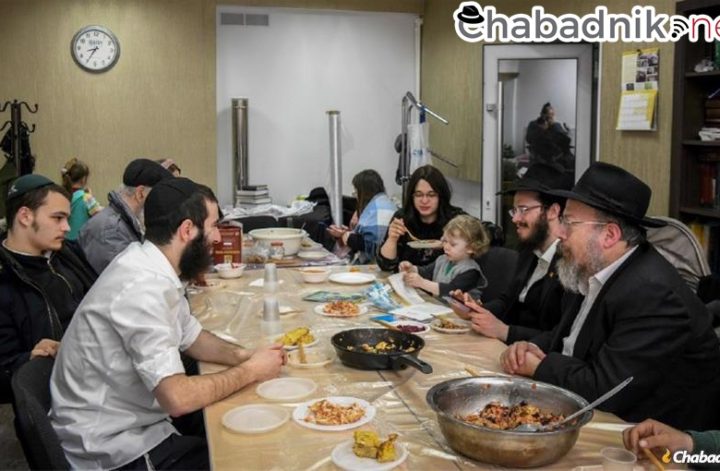Mega-seders and home deliveries require many tons of shmurah matzah, wine and other staples
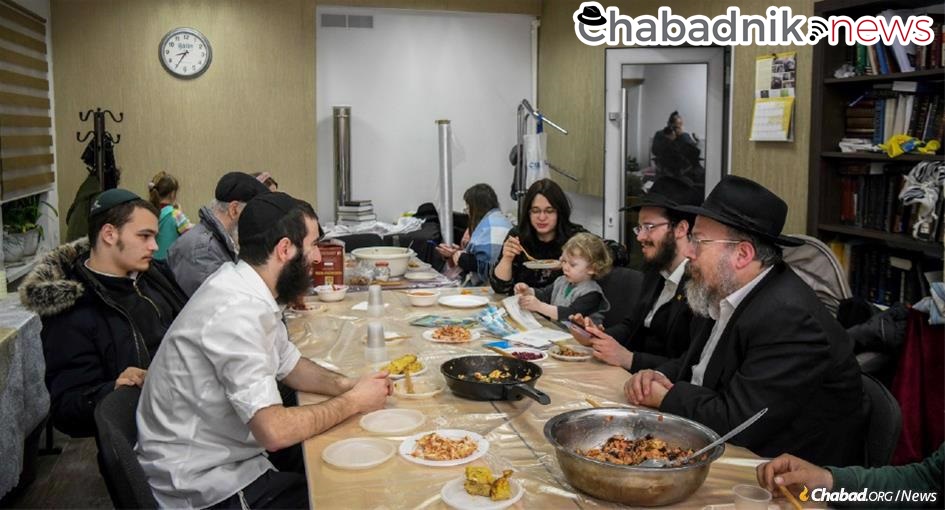
First in a series of articles on helping the Jews of Ukraine to celebrate Passover
Passover has always been a celebration of freedom and redemption for Jews the world over, but also a time to focus on the needs of the community’s most vulnerable, with a declaration at the beginning of the Passover Seder that “whoever is hungry, come and eat.” This year, for Chabad-Lubavitch communities across Europe, the two themes will converge on Friday night, April 15, when thousands of refugees are expected to participate in Chabad Passover Seders across the continent. Additionally, many will receive food packages at their hotels and apartments from Finland to Croatia, and of course, in the busy border nations of Poland, Romania and Moldova, places teeming with refugees.
In Berlin, which has become a central refugee hub, Chabad of Berlin is working to procure the necessary supplies for many hundreds of Jewish refugees to celebrate the holiday. The quantities are astronomical, and the costs are piling up. Eight public seders will be hosted across Berlin, with shipments of 6,600 pounds of shmurah matzahon the way, as well as 3,000 bottles of kosher wine and pallets of other staples. Chabad of Berlin’s Rabbi Dovid Tiechtel says they’ve spent $120,000 so far on the additional goods.
But supply chain woes and higher-than-ever prices make it a challenge to procure, says Rabbi Shneor Havlin, director of Chabad of Dresden, on the banks of Germany’s Elbe river. While Dresden only has close to 100 Jewish refugees so far, Havlin’s faced difficulties in importing the extra supplies. “We need to bring everything in from outside,” Havlin tells Chabad.org. “So far, we’ve ordered meat, chicken, wine, matzah, and G‑d willing it’ll all arrive in time.”
He’s awaiting 330 pounds of meat, 900 pounds of chicken, 150 bottles of wine, and 110 pounds of shmurah matzah—costing $8,600. “I hope we will easily find a way to pay for this,” the rabbi adds, noting that most funds raised internationally are being allocated directly to saving lives by evacuating them out of cities under fire, and the need everywhere is far outpacing the available resources.
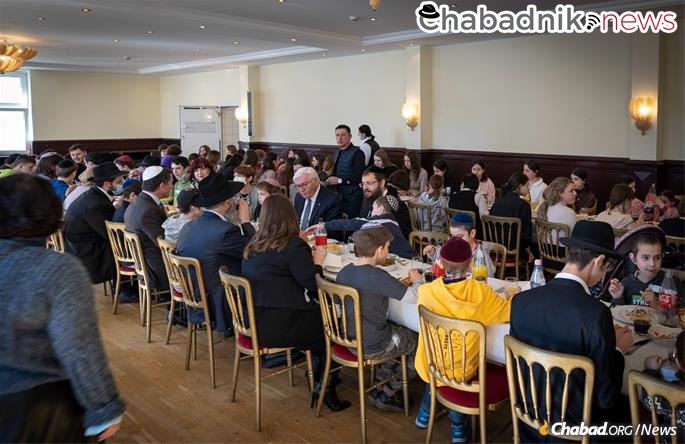
Unexpected Mega-Seders
Over the Ukrainian border in Warsaw, Rabbi Shalom Ber Stambler, director of Chabad of Poland, is preparing the kind of seder that used to only happen in Nepal or Thailand. “We’re already hosting 2,000 people at the seder,” he says, noting that a normal year would see up to 600 attend Chabad of Warsaw’s seder. Today, Stambler feeds 400-600 refugees each day alone, with no end in sight. “We will continue to care for them as long as necessary, with dignity and respect,” he says.
Farther south, Rabbi Pinchas Zaklos, director of Chabad of Croatia, says they’ll be providing all the Passover essentials to the more than 500 Jewish refugees who are currently in the capital city of Zagreb. The city provides the refugees with free housing, he explains, and Chabad is ordering extra quantities of Passover food to deliver to each home. “We ordered an additional 330 pounds of matzah and 500 extra bottles of wine, along with two ton of fresh fruit and vegetables,” Zaklos says.
Zaklos says the much-needed help has been immensely appreciated. “Amid this darkness, Chabad is the light,” one refugee, Alex Marinovsky, told the rabbi.
In Podgorica, Rabbi Ari Edelkopf, director of Chabad of Montenegro, is importing more supplies and preparing to deliver Passover packages to refugees, as well as spending money ahead of the holiday. He says that Chabad of Montenegro is exploring whether it will be necessary to host several public seders around the country.
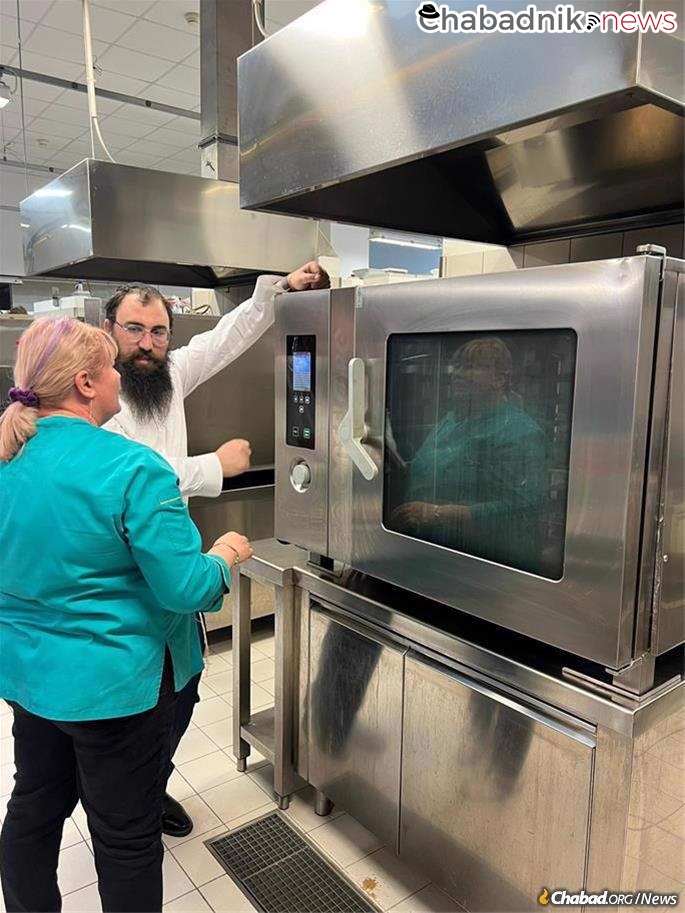
From Sofia, Rabbi Yosef Salamon, director of Chabad of Bulgaria, reports that they’re also gearing up for a busier Passover than usual, with dozens of refugees expected to participate. And in Helsinki, Rabbi Benyamin Wolff has opened the doors of Chabad of Finland to refugees and is arranging extra Passover staples, though he isn’t sure how many to expect.
The three Baltic small states have likewise seen refugees make their way there. “Thank G‑d, we’ve managed to integrate them with local Jewish families with our ‘Adopt a Refugee’ program,” says Rabbi Shmuel Kot, director of Chabad of Estonia. The integration has been made easier by the fact that most Jews in Ukraine and Estonia also speak Russian. “These families will receive everything they need for Passover, and can participate in our communal seder or celebrate at home in a family environment.”
Kot has been scrambling to procure additional Passover essentials, but he says there’s a shortage across Europe.
“It’s crazy,” he says. “I just finished an order from Germany, they’re expecting the container next week. Of course, the prices are up.” He’s already ordered a pallet of grape juice and Wednesday morning ordered an additional pallet of wine. Close to two tons of shmurah matzahare on the way, and of their two pallets of meat and chicken, only half showed up.
“There’s a real shortage,” Kot says. “But we’re certain G‑d will make sure the Jewish people have a happy and kosher Passover wherever in the world they are, including here in Estonia.”
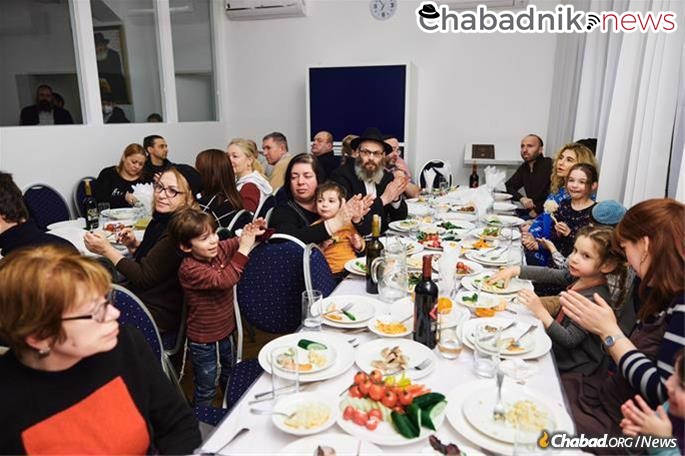
This is the first in a series of articles on providing for the needs of Ukraine’s Jews during the upcoming holiday of Passover. In progress are articles on how Chabad-Lubavitch is helping the many Jews still in Ukraine , as well as how refugees who are now in Israel are being helped to celebrate the eight-day holiday.
The Ukraine Jewish Relief Fundhas been established to help provide assistance to the Jewish communities in Ukraine impacted by the war.
Click here for a prayeryou can say and a list of good deeds you can do in the merit of the protection of all those in harm’s way.

